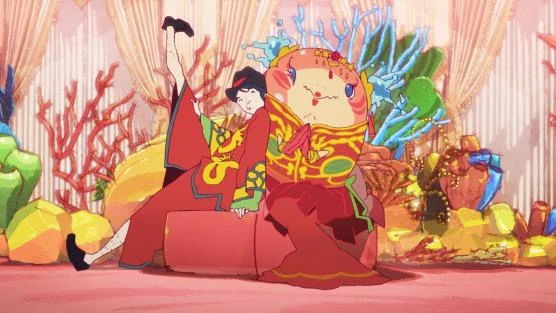Ajyal Feature Film Competition
In a near-future where humans and merfolk coexist, a gentle office worker is suddenly proposed to by a mermaid princess and finds his carefully ordered life turned inside out. As they navigate clashing customs and everyday misunderstandings, sincere affection begins to dismantle habit and fear. A playful romance becomes a study in tolerance: love as translation, patience as courage, and a city learning to accommodate difference.
In a near-future where humans and merfolk coexist, a gentle office worker is suddenly proposed to by a mermaid princess and finds his carefully ordered life turned inside out. As they navigate clashing customs and everyday misunderstandings, sincere affection begins to dismantle habit and fear. A playful romance becomes a study in tolerance: love as translation, patience as courage, and a city learning to accommodate difference.
▶ Watch Trailer
A mild-mannered shipyard office worker is blindsided when a mermaid princess proposes marriage and moves in. Their new life is messy and joyous, lost in translation one moment, disarmingly sincere the next. Around them, a near-future city tilts between regulation and possibility; an official willing to harm fish for profit embodies a brittle idea of progress, while the couple test another: that mutual regard can redraw civic space itself. Lovingly crafted in traditional hand-drawn animation, faces breathe, hair and hands carry intention, and shifts in light reveal the tremor of feeling beneath the humour. Style serves meaning: when characters from different worlds share the frame, the composition itself becomes a conversation about balance and attention.
Rather than scoring easy points against power, the film employs wit and genuine tenderness to move us toward patience, toward the work of understanding, and toward a future wide enough for more than one way of being. What lingers is not just the arc from shyness to devotion, but the idea that love can serve as a model for how communities might reconcile competing needs without erasing differences. In a time of entrenched divides, the story offers a bright, humane rejoinder, suggesting that tolerance is less a slogan than a daily practice of care.
A mild-mannered shipyard office worker is blindsided when a mermaid princess proposes marriage and moves in. Their new life is messy and joyous, lost in translation one moment, disarmingly sincere the next. Around them, a near-future city tilts between regulation and possibility; an official willing to harm fish for profit embodies a brittle idea of progress, while the couple test another: that mutual regard can redraw civic space itself. Lovingly crafted in traditional hand-drawn animation, faces breathe, hair and hands carry intention, and shifts in light reveal the tremor of feeling beneath the humour. Style serves meaning: when characters from different worlds share the frame, the composition itself becomes a conversation about balance and attention.
Rather than scoring easy points against power, the film employs wit and genuine tenderness to move us toward patience, toward the work of understanding, and toward a future wide enough for more than one way of being. What lingers is not just the arc from shyness to devotion, but the idea that love can serve as a model for how communities might reconcile competing needs without erasing differences. In a time of entrenched divides, the story offers a bright, humane rejoinder, suggesting that tolerance is less a slogan than a daily practice of care.

